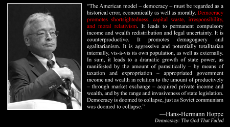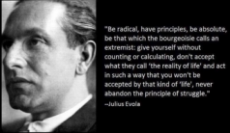This thread is about summarizing books into their key points and major takeaways for other anons to quickly get up to speed.
All too often, I come across books branded as "must-read" (a la >>179533 →) that wind up being 300+ page tomes - something that I and many other busy anons here simply do not have the time to read through. This is made even worse when the suggestion to read said 300+ page books is, more often than not, a simple declaration of "trust me, it's good" - not exactly the best sales pitch to be making.
Therefore, I'd like the summaries to not only be about the book's contents, but why somebody should pick it up and read it in the first place - why do they need to know what is in these books?
inb4 quit being lazy fggt
/mlpol/ - My Little Politics
Archived thread
>300+ pages
>tome
Anon please
>tome
Anon please
>>217111
I'll give a few.
REVOLT AGAINST THE MODERN WORLD
Julius Evola
Evola lays out a alternative metaphysical worldview for right wingers. Within his book he explains the sacredness of the Indo-Aryan peoples traditions. This goes from Vedic texts to western early Chivaliric tradition. He comments on how the heroism of Vedic and Chivaliric times are very similar and how both are at best about the warrior priest, which to him is the most sacred group of them all. He then goes onto explain the necessity of hierarchy and caste.
Lastly Evola describes how hierarchy and love of order are rooted within a tradition of solar worship. The antithesis of this solar tradition is the lunar tradition which is one not of man but women, and so represents decay, degeneracy, and disorder. Evola goes onto then explain how in Europe the best times of solar symbolism are the times of Augusts Cesar and of the Chivaliric times. This leads Evola into the present where he critics the US as nothing more then a degenerate lunar kingdom. To Evola this means all the US is to stand for should be revolted against since it is nothing more then a feminine evil rather then a solar dignity seen in a warrior priesthood.
I'll give a few.
REVOLT AGAINST THE MODERN WORLD
Julius Evola
Evola lays out a alternative metaphysical worldview for right wingers. Within his book he explains the sacredness of the Indo-Aryan peoples traditions. This goes from Vedic texts to western early Chivaliric tradition. He comments on how the heroism of Vedic and Chivaliric times are very similar and how both are at best about the warrior priest, which to him is the most sacred group of them all. He then goes onto explain the necessity of hierarchy and caste.
Lastly Evola describes how hierarchy and love of order are rooted within a tradition of solar worship. The antithesis of this solar tradition is the lunar tradition which is one not of man but women, and so represents decay, degeneracy, and disorder. Evola goes onto then explain how in Europe the best times of solar symbolism are the times of Augusts Cesar and of the Chivaliric times. This leads Evola into the present where he critics the US as nothing more then a degenerate lunar kingdom. To Evola this means all the US is to stand for should be revolted against since it is nothing more then a feminine evil rather then a solar dignity seen in a warrior priesthood.
1555359954.png (281.3 KB, 900x500, Hoppe Democracy is a failure.png)

>Democracy: The God that Failed, by Hans Hermann-Hoppe
Hoppe first argues that the state, by its very nature as a parasitic institution, is detrimental to society, and that whereas the parasitism inflicted on society by the monarchic state is at least somewhat restricted, these restraints are obliterated in a state overseen by temporary caretakers elected by the populace. He argues that since a king owns the state apparatus, he will not be so willing to go into debt because he or his heirs will pay for it, while a democratic politician will have no qualms about recklessly spending in order to gain votes or keep their rich qnd powerful friends happy. He also argues that monarchs are more likely to take an interest in the long term well-being of the land they rule, so that their children will inherit a wealthier economy from which they can more easily extract wealth. If the king is not stupid, he will not raise taxes or devalue the currency more than he can without ruining the economy, or let in massive numbers of unproductive people. There is also the point that democracy erases a "class consciousness" that exists between the state and society. Under a monarchy, there is a clear distinction between taxer and taxed. Thus, society views the king with suspicion, along with any attempts he might make to raise taxes or interfere with the business of his subjects. When anyone can enter into government, that line is blurred, or erased. This means the state can now easily loot massive sums of money from society, and say society is paying it to itself. Furthermore, the suspicion that would've been cast upon the King and his state by each citizen is now cast upon his neighbor, since politicians will invariably pander to one group, promising to plunder others on their behalf. Hoppe also devotes some space to the question of an alternative to the state in providing protection and order.
Hoppe first argues that the state, by its very nature as a parasitic institution, is detrimental to society, and that whereas the parasitism inflicted on society by the monarchic state is at least somewhat restricted, these restraints are obliterated in a state overseen by temporary caretakers elected by the populace. He argues that since a king owns the state apparatus, he will not be so willing to go into debt because he or his heirs will pay for it, while a democratic politician will have no qualms about recklessly spending in order to gain votes or keep their rich qnd powerful friends happy. He also argues that monarchs are more likely to take an interest in the long term well-being of the land they rule, so that their children will inherit a wealthier economy from which they can more easily extract wealth. If the king is not stupid, he will not raise taxes or devalue the currency more than he can without ruining the economy, or let in massive numbers of unproductive people. There is also the point that democracy erases a "class consciousness" that exists between the state and society. Under a monarchy, there is a clear distinction between taxer and taxed. Thus, society views the king with suspicion, along with any attempts he might make to raise taxes or interfere with the business of his subjects. When anyone can enter into government, that line is blurred, or erased. This means the state can now easily loot massive sums of money from society, and say society is paying it to itself. Furthermore, the suspicion that would've been cast upon the King and his state by each citizen is now cast upon his neighbor, since politicians will invariably pander to one group, promising to plunder others on their behalf. Hoppe also devotes some space to the question of an alternative to the state in providing protection and order.
>>217349
I'd be interested in the contents of Spengler's Decline of the West, if at all possible.
Some of Evola's works could be interesting to see a summary on as well, if that's more of your thing.
I forget what the names of some of the other more prolific authors are, so I'll just leave it at "whatever you think is an absolute need-to-know".
Thanks in advance!
I'd be interested in the contents of Spengler's Decline of the West, if at all possible.
Some of Evola's works could be interesting to see a summary on as well, if that's more of your thing.
I forget what the names of some of the other more prolific authors are, so I'll just leave it at "whatever you think is an absolute need-to-know".
Thanks in advance!
5 replies | 4 files | 5 UUIDs | Archived



 Ex: Type :littlepip: to add Littlepip
Ex: Type :littlepip: to add Littlepip  Ex: Type :eqg-rarity: to add EqG Rarity
Ex: Type :eqg-rarity: to add EqG Rarity 